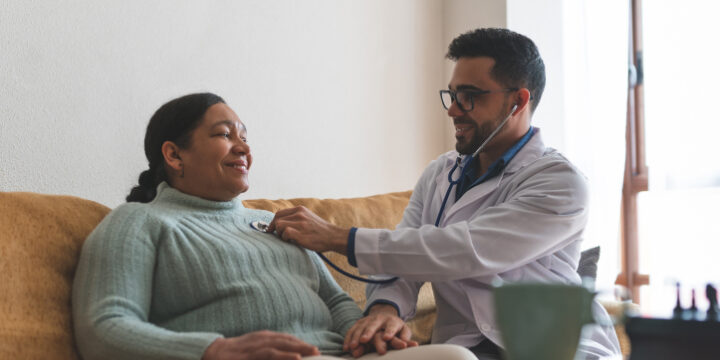CDC's Adult Vaccine Quiz
Adult Vaccine-Prevent-able Diseases eBook
Commonly Asked Questions About Vaccines for Adults
Yes. Vaccination is the safest way to help you build protection against severe illness and death from COVID-19.
Everyone 6 months of age and older is recommended to get vaccinated against COVID.
Updated vaccines are now widely available. Click here to find a COVID-19 vaccine near you.
There is no way to know for certain how COVID-19 will affect you – you might have a mild case or you could have serious, life-threatening complications. While you might have an uncomfortable few days after getting vaccinated against COVID-19, it is the safest way to help build protection.
Also, if you get COVID-19, you also risk giving it to loved ones who may get very sick or even die from the COVID infection.
Additional Resources
Adults of any age with these medical conditions can be more likely to get severely ill from COVID-19. Severe illness means that a person with COVID-19 may need hospitalization, intensive care, a ventilator, or they may even die.
Older adults are more likely to get severely ill from COVID-19 than younger people, but serious COVID illness, hospitalization and death does occur in children, teens and young adults too. Similar to adults, children with obesity, diabetes, asthma or chronic lung disease, sickle cell disease, or immunosuppression can also be at increased risk for severe illness from COVID-19. In addition, current data shows that that children with genetic, neurologic, metabolic conditions, or with congenital heart disease can also be at increased risk for severe illness from COVID-19. One way to protect the health of children is to ensure that all adults in a household are fully vaccinated against COVID-19.
Additional Resources
Get answers to your questions about COVID-19 vaccines on our Q&A page.
You can also find more resources related to COVID-19 and the vaccines that help prevent it, here.
More answers to your questions can be found at getvaccineanswers.org
No one should skip vaccinations because they can’t pay for them. There are several programs available to help people who can’t afford to pay for recommended vaccines. See below for more information or use our Paying for Vaccines Online Tool.
COVID-19 Vaccines
COVID-19 vaccines are free for people living in the United States.
The CDC has made recommendations related to travel within the U.S. and internationally. Get the most up-to-date information on this topic on CDC’s website.
Recently, the U.S. experienced outbreaks of measles across the country, and you may be asking yourself if you need to get a vaccine.
According to the CDC, if you were born after 1957 you need at least 1 dose of measles vaccine or MMR (measles-mumps-rubella) vaccine, UNLESS a laboratory confirmed that you had past measles infection or are immune to measles.
Certain adults may need 2 doses of MMR vaccine, including:
- students at post-high school education institutions
- healthcare personnel (see more information below)
- international travelers (see more information below)
- people who public health authorities determine are at increased risk for getting measles during a measles outbreak
If you’re not sure whether you are up to date on measles vaccination, talk with your doctor.
If I got the old version of the measles vaccine in the 1960s, do I need to be revaccinated with the current version of the measles vaccine?
According to the CDC, if you know that you got the killed measles vaccine (an earlier formulation of measles vaccine that is no longer used) in the 1960s, you should talk to your doctor about getting revaccinated with the current, live measles-mumps-rubella (MMR) vaccine. Not many people fall into this group; the killed vaccine was given to less than 1 million people between 1963 and 1968. Also, most people don’t know if they got the killed vaccine during this time.
If you’re unsure whether you fall into this group, you could ask your doctor to test your blood to determine whether you’re immune. Or you can just get a dose of MMR vaccine. There is no harm in getting another dose of MMR vaccine, even if you may already be immune to measles (or mumps or rubella).
If you are unsure whether your are immune to measles.
If you’re unsure whether you’re immune to measles, you should first try to find your vaccination records or documentation of measles immunity. If you do not have written documentation of measles immunity, you should get vaccinated with the MMR vaccine. Another option is to have a doctor test your blood to determine whether you’re immune, but this option will take two doctor’s visits. There is no harm in getting another dose of MMR vaccine, even if you are already be immune to measles (or mumps or rubella).
Do You Need a Booster Shot?
No. If you got two doses of measles/MMR vaccine as a child, according to the U.S. vaccination schedule, the CDC considers you to be protected for life against measles. Again, if you’re not sure whether you are fully vaccinated, talk with your doctor.
If You are Traveling Internationally
As measles is still common in other countries, unvaccinated people continue to get measles while abroad and bring the disease into the United States and spread it to others.
The CDC recommends that adults without evidence of immunity against measles* get 2 doses of MMR vaccine separated by at least 28 days.
*Evidence of immunity against measles includes at least one of the following: written documentation of vaccination, laboratory evidence of immunity, laboratory confirmation of measles, or birth in the United States before 1957.
If You are a Healthcare Provider
The CDC states that healthcare personnel should have documented evidence of immunity, according to the recommendations of the ACIP. Healthcare personnel without evidence of immunity should get 2 doses of MMR vaccine, separated by at least 28 days.
No. The way that flu vaccines are made, they cannot cause the flu. Flu shots are made from either flu viruses that have been inactivated (killed) OR with proteins from a flu virus. (In other words, only parts of the flu virus are used instead of the full virus).
Nasal spray flu vaccine is made with weakened live flu viruses, and also cannot cause the flu. The weakened viruses are cold-adapted, which means they can only cause flu infection at the cooler temperatures found in your nose. These viruses cannot infect your lungs or other warmer areas of your body.
While some people may get mild side effects from the flu shot like a sore arm, a headache, muscle aches or a low fever, those side effects usually begin soon after the shot and only last 1 -2 days. These are actually signs that the vaccine is working and your body is building immunity.
Learn more and find more answers to your flu-related questions by visiting current flu season.
Yes. The CDC’s Recommended Adult Immunization Schedule is available on the CDC website. You can also take the CDC’s Adult Vaccine Quiz to see which vaccines are recommended for you.
Protecting yourself against diseases through vaccination also protects your family, friends, coworkers and others you might come in contact with, including vulnerable infants, pregnant women, and people with weakened immune systems.
Getting sick with diseases like the flu, COVID-19, pneumonia, shingles, and other vaccine-preventable diseases are not only inconvenient with days of bed rest, missed work, cancelled plans and possible hospitalization, but can also be extremely dangerous to any adult. In fact, during a recent flu season a perfectly healthy 21-year-old bodybuilder in Pennsylvania died from the flu within 24 hours of showing symptoms. The CDC estimates that since 2010, flu annually results in:
Some of these people were healthy prior to getting the flu.
All of the diseases that we protect ourselves against are still spreading here in the U.S. and abroad. As a matter of fact, many outbreaks of measles in the U.S. started from travelers who were exposed to diseases when visiting other countries and returned home unknowingly infecting fellow travelers and others once back in the U.S.
Staying up-to-date with all of the recommended vaccines is the best way to protect yourself, your family and your community against serious, and potentially deadly, vaccine-preventable diseases.
People of all ages can get whooping cough (also known as pertussis), but the disease can be very dangerous for babies, as they are at particularly high risk of serious complications, hospitalization and death.
Whooping cough easily spreads from person to person through coughing or sneezing or by just sharing breathing space. Since the symptoms of whooping cough can vary, some people with whooping cough may just have a mild cough or what seems like a common cold, and they can end up spreading it to babies they are in close contact with. In fact, most unvaccinated children living with a family member with whooping cough will get the disease.
Vaccination is the best way to protect people of all ages, especially infants and young children, from whooping cough. For babies and young children, the vaccine to protect against whooping cough is called DTaP. For preteens, teens, adults and pregnant women, the vaccine is called Tdap.
The CDC recommends a one-time dose of Tdap for all adults 19 years and older. The vaccine is especially important if you are planning to be around babies and young children.
Pregnant individuals should get a Tdap vaccine during the 3rd trimester of each pregnancy to protect themselves and their babies against whooping cough.



